|
Legendary Lunch
News
of the death of spy-fiction supremo Anthony Price arrived just as last month’s
column was going to press, but the Shots tribute can be found HERE. I am immensely grateful to Anthony’s
daughter Kate and son James for sending me a copy of a famous group photograph
which I had heard about and written about, but never seen before.

The
occasion was the 75th birthday of Eric Ambler, to whom all British thriller
writers owe a debt, and a ‘surprise’ birthday lunch (it is rumoured that a
‘mole’ tipped off Eric beforehand) thrown by fellow writers at the Savoy in
1984.
The
line-up of these usual suspects is, to say the least, impressive. [Back row,
left to right:] Ted Allbeury, Frederick Forsyth, John Gardner,
Julian Symons, Miles Tripp (aka John Michael Brett), Gavin Lyall and Kingsley
Amis (aka Robert Markham). [Middle row:] David Cornwell (John Le Carré),
Eric Ambler and Lionel Davidson. [Front row:] Anthony Price, H.R.F.
(Harry) Keating and Len Deighton.
Oh
to have been a spy on the wall…
Mosaicista
I
am not sure whether a Mosaicista is a female designer of mosaics – intricate
designs made of small pieces – but if there is such a title, I will award it to
Caro Ramsay for her stand-alone chiller, titled, appropriately, Mosaic,
now out from Severn House. And yes, a mosaic does feature in the book, along
with a remote but elaborate family house near Dunoon and Holy Loch in that wild
and lonely place that is Scotland.

The
novel is populated by at least two dysfunctional families and characters who
are either mad or dead or both and the plot is a mosaic of mis-remembered
truths, downright lies and deeply hidden family secrets. With one narrator who
is deaf (and possibly schizophrenic). a family with an impressive track record
in suicide by hanging, plus deaths by explosion, anorexia and strangulation, Mosaic
is, well, a vibrant mosaic of crime, suspicion, sibling rivalry and,
above all, guilt. Along the way it scores points in the modern class war
between the haves and the have nots, describing one upper-crust character as
coming from ‘a good family who spoke dead birds and shotguns fluently’, but
also dealing with life on the very wrong side of the tracks.
Caro
Ramsay keeps a wonderfully tight grip piecing together a story which could have
spiralled out of control, always keeping one eye over her shoulder on the
conventions of the classic crime novel and mostly adhering to them, if
sometimes with tongue gloriously in cheek. Already an established author of
police procedurals, Caro Ramsay has branched out and written a genuinely
hypnotic, often disturbing psychological thriller which reminded me of Ruth
Rendell in her heyday.
Grave Goods
Some
years ago now, for my obligatory mid-life crisis I eschewed the temptations of
a sleek red sports car, denied myself the urge to take up the guitar and form a
band and firmly resisted the need to become a best-selling thriller writer with
all the pressures that entails. Instead I became an archaeologist, if only to
be able to claim that I was (probably) the only crime writer who regularly
tripped over dead bodies.
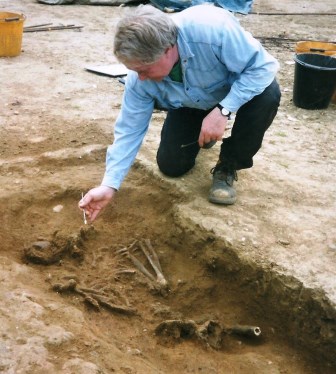
They
were, of course, very dead bodies, skeletons in fact, long past being of
interest to the police, and finding a “skelly” was something of a point of
honour among field archaeologists. My first “skelly” had been hastily buried in
the kitchen garden of a medieval cottage from which dating evidence suggested a
date of around 1350. It was highly probable that the unfortunate male I
discovered was a victim of the Black Death, which was known to be on the
rampage in the area at the time.
Not
surprisingly then, I was drawn to S.D. Sykes’ fourth novel, The Bone Fire
(Hodder), which is set in 1361 when the plague had got its second wind and was
again ravaging southern England.
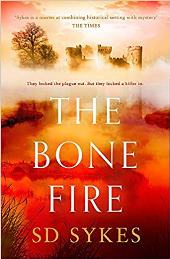 I
can see why Sarah Sykes’ series hero Oswald de Lacy is rapidly recruiting an
army of faithful followers and he could well become as popular as that legend
of medieval mysteries, Brother Cadfael, though Oswald is no world-weary monk.
He is a land-owning lord, a family man, widowed with a second wife acquired on
his travels in Venice, a four-year-old son, a valet, also Venetian, and a
mother in tow, all of them seeking refuge from the resurgent plague. I
can see why Sarah Sykes’ series hero Oswald de Lacy is rapidly recruiting an
army of faithful followers and he could well become as popular as that legend
of medieval mysteries, Brother Cadfael, though Oswald is no world-weary monk.
He is a land-owning lord, a family man, widowed with a second wife acquired on
his travels in Venice, a four-year-old son, a valet, also Venetian, and a
mother in tow, all of them seeking refuge from the resurgent plague.
The
refuge Oswald chooses is an isolated castle deep in the even more isolated
Kentish marshes, thinking that once inside with gates closed and the portcullis
firmly down, his family will be safe from the Black Death. But the castle – the
ultimate ‘locked room’ setting – is not a safe harbour at all as there is, of
course, a murderer locked in there with them, not to mention an interesting –
and equally dangerous – religious question underlying the whole story.
The
Bone Fire is a neatly done, crisply-paced
historical ‘cosy’ if ‘cosy’ can ever be used in the same sentence as ‘Black
Death’, written with a fine sense of place and time.
Madball
 There
are certain writers I have always had on my radar but never actually got
around, mostly through being both incompetent and impecunious, to reading. One
of them is the American pulp-master Frederic Brown (1906-1972), who is possibly
better known for his output of science-fiction stories, but made quite a splash
with his debut mystery novel The Fabulous Clipjoint in 1947. There
are certain writers I have always had on my radar but never actually got
around, mostly through being both incompetent and impecunious, to reading. One
of them is the American pulp-master Frederic Brown (1906-1972), who is possibly
better known for his output of science-fiction stories, but made quite a splash
with his debut mystery novel The Fabulous Clipjoint in 1947.
Now
thanks to the formidable Stark House Press, I will get the chance to sample
Frederic Brown’s Madball from 1953, which is being reissued in
Stark House’s wonderfully-named imprint Black Gat Books.
Secret Service
I
thought there was one American author who had been firmly on my radar for
almost thirty years, but last month, late one Saturday, I found myself watching
a late-night movie on television: The Sentinel, starring Michael
Douglas, Kiefer Sutherland and the wonderful, though under-used, Kim Basinger.
It was a competent thriller, not without huge plot holes, but what surprised me
was the fact, revealed in the credits, that it was based on a book by Gerald
Petievich.
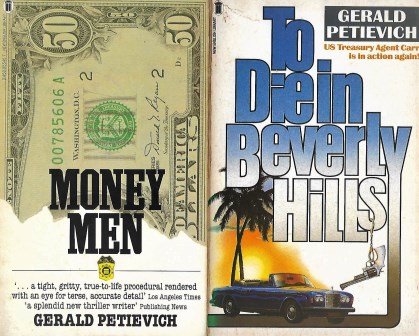
Petievich,
a Secret Service man himself and formerly in US Army counter- intelligence,
wrote some absolutely cracking crime thrillers in the 1980s which I have
recommended wholeheartedly to anyone who would listen, although dropping his
name to British readers only produced blank looks. I have to admit to blank
looks myself when I saw he had written the novel behind The Sentinel,
which was published in 2003 in America, though not, as far as I can discover in
my defence, in this country.
Blowing one’s top
One
can go for ages without reading a book set around Mount Vesuvius in AD79 and
then two come along at once. It last happened when I read Robert Harris’
historical thriller alongside Professor Mary Beard’s historical account of the
destruction of Pompeii.
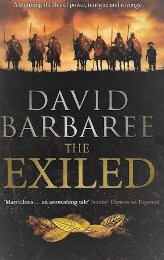 
This
month it’s another thriller The Exiled and an excellent
biography, In the Shadow of Vesuvius. Both feature settings
around the Bay of Naples and (SPOILER ALERT) the eruption of Vesuvius, which in
the thriller comes at the end but which kick starts the biography.
The
Exiled by Canadian David Barbaree, published by
Zaffre, has a plot which bravely tackles the internecine war which disrupted
the Parthian Empire (anyone?), the main rival to Rome when it came to
domination in the eastern world. Moreover, the powers-that-be in Rome are
paranoid that a fake Nero claiming to be the legitimate (deposed) Emperor will
become a rallying call for opposition to the new Flavian dynasty.
Among
the Roman elite soaking up the Naples sunshine in their villas around the bay
are Pliny the Elder, the politician and polymath author, and his rather geeky
nephew Gaius, known as Pliny the Younger. Historian Daisey Dunn gives us, with In
the Shadow of Vesuvius published by William Collins, an outstanding –
and outstandingly entertaining – biography of the younger Pliny, which begins with
the most famous incident involving the elder one: his death.
Being
a prototype scientist and dedicated student of the natural world who made notes
on absolutely everything, Pliny the Elder was an eyewitness to Vesuvius blowing
its top and couldn’t help sailing across the bay to get a better view and help
the fleeing citizens of Pompeii and Herculaneum. Unfortunately he got too close
to the action and Vesuvius claimed its most famous victim. It was almost a
double event as Pliny the Younger was invited to accompany his uncle but, being
a bit of a swot, preferred to stay in his bedroom and do his homework.
SpecSavers
I really must go to Specsavers. Not because they are the generous sponsors of my favourite crime fiction convention CrimeFest (though if there’s a discount going, that’s a good enough reason), but the pince-nez I have relied on for many years have finally let me down.

I realised this when a South American colleague posted an interesting review of a book about the influence of Nazism in post-war Argentina which I mistakenly read as Nazis in Sombreros.
And whilst mentioning CrimeFest, even if in passing, here is a genuine piece of news (and how often can that be said of this column?). Owing to a change in Bank Holidays and the planned celebrations for the fiftieth anniversary of VE Day, the dates of next year’s CrimeFest will be 4th to 7th June 2020.
Gogglebox
Whilst some of my readers are still entranced by repeats of Poirot on ITV 3 (and haven’t yet blown a fuse at the revisionist version with John Malkovich), I have been getting down with the kids and binge-watching whole series of crime dramas and thrillers thanks to broadcasting companies I was previously unaware of such as Nowflix and NetTV as I think they are called.

By managing to manipulate several remote controls, I have discovered, in recent months, the ultra-violent American crime saga Banshee, its Canadian-set equivalent Tin Star and the excellent conspiracy thriller Deep State which stars the wonderful Walton Goggins and several people you’ve seen in Game of Thrones and the latest Star Wars.
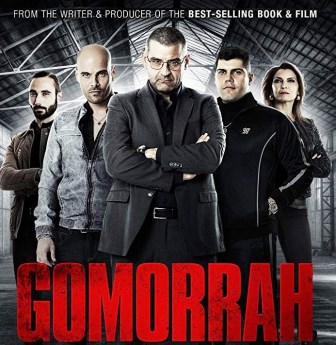
Best of all though is the return, for a fourth series, of the brilliant Italian crime drama based around the Camorra families of Naples, Gomorrah. I would advise newcomers to this show to start at Series One (Spoiler alert: only one of the characters above is still alive by Series 4) and even those who speak Italian may have to resort to the sub-titles as the Neapolitan dialect is pretty impenetrable.
Gomorrah should keep me going until the new series of the superb French police drama Spiral starts later this month.
|
|
Books of the Month
This year Peter Lovesey will be celebrating his 83rd birthday, his 49th year as a published crime writer and his second Lifetime Achievement award, so it is only fitting that he should cap all that with a new novel, Killing With Confetti, published by Sphere, his 38th if my maths is correct, which it rarely is.
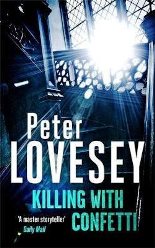
Given the title, it’s a fair guess that a wedding is involved in his latest novel and when it’s a wedding between the son of an Assistant Chief Constable and the daughter of a notorious crime baron, the word ‘Killing’ is not necessarily incongruous, especially as the reception is to be held in Bath’s famous baths, which must have seen a fair amount of skull-duggery back in Roman times. Fortunately, Aqua Sulis’ head of CID, and Lovesey’s series hero, Peter Diamond is on hand to keep the peace.

It is not unusual for a debut thriller to be given glowing endorsements from established authors, but I have rarely seen so many effusive recommendations for a new author as Alex North has received for The Whisper Man, now out from Penguin/Michael Joseph.
An impressive array of writers, including Stuart MacBride, Mick Herron, James Oswald, Alex Marwood, C.J. Tudor, Luca Veste and Brad Meltzer, have all given the book generous praise but perhaps the most resounding accolade comes from Steve Cavanagh who has been quoted as calling The Whisper Man ‘The best crime novel of the decade’. Now I am tempted, as I often am, to mis-quote the famous Jack Palance line and point out that the decade ain’t over yet, but what I find more interesting is that the crime-writing of the ebullient and generous Steve Cavanagh has taken place in this decade, which means in effect that he rates Alex North’s debut as better than anything he has written, an outstanding piece of literary largesse, the like of which I cannot ever remember encountering.
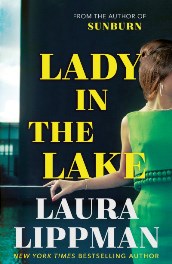
Laura Lippman is a name which ought to be better known over here and not just her award-winning series featuring Tess Monaghan, a former Baltimore journalist (as was Lippman) turned private eye. She also writes outstanding stand-alone thrillers with the role (or plight) of women at their core.
With Lady in the Lake, published this month by Faber, Lippman returns to Baltimore and the world of news reporting but the time-frame is the 1960’s and the plot revolves around a missing Negro woman whose body turns up in…well, not quite the ‘Lake’ which the title suggests. Told through multiple voices, one of them distinctly haunting, the novel tackles race and gender politics with intelligent sidebars on journalism and religious affinities, the result is a compulsive and very satisfying novel.
*
Thankfully there is no longer a dearth of good, strong female characters in spy fiction, and it is not just down to Killing Eve, but female writers of spy-fi are still something of a rarity, so two new additions to the ranks are very welcome.

Lauren Wilkinson, in what may be a debut novel, tells the story of her American Spy, published by Dialogue Books, in multiple flashbacks starting with a violent assault on her and her family in Connecticut in 1992. Being a resourceful intelligence officer with the FBI, Marie Mitchell proves more than capable of killing the assassin who comes calling in the middle of the night, despite getting little help from the family dog, a ‘German Shepherd mix’ called Poochini.
Knowing who is after her, Marie decides to disappear and two days later is in Martinique in the Caribbean with her young sons and, amazingly, Poochini who failed to take a bullet for her but seemingly warranted a seat on the plane from America.
Marie’s story is gradually revealed and it is an engrossing one, detailing her early career in the FBI as a young, black female in a very white all boys’ club in the mid Sixties, up to the special mission she is recruited for in Burkina Faso (still called Upper Volta in my Atlas) in the 1980’s under the ‘revolutionary’ leadership of Thomas Sankara. In Africa, Marie has to deploy her numerous skills including the ability to kill and her survival instincts in a hair-raising escape on a motor-bike across the desert. American Spy is unusual, intelligent, compassionate and thoroughly original.

Singapore-based Shamini Flint, who has already established herself on the crime scene with her Inspector Singh mysteries, has turned her hand to the ‘global’ thriller in The Beijing Conspiracy, published by Severn House. The plot includes the identity of the unknown but iconic figure of ‘tank man’ – the student (?) who famously stood in Tiananmen Square in 1989, defying a Chinese army tank – a highly-placed Chinese official who is actually an American mole code-named Emperor, and a plan to seduce America into a nuclear war over North Korea.
Thank goodness this is fiction, as the character of the US President – bombastic, vain, unable to grasp diplomatic concepts – proves. Surely such a character cannot be based on a real leader of the free world. The whole thing comes to a race-against-the-clock climax with fleets sailing into no-go areas, jet fighters being scrambled and a lot of shots ringing out just in time to avert a nuclear conflict. Ambitious, breathless, dramatic stuff.

One book I would not recommend to lovers of Golden Age mysteries, or to anyone planning a holiday in Mexico, is Call Him Mine, the powerful debut thriller by Irish journalist Tim MacGabhann, published this month by Weidenfeld & Nicolson. This has already been described as ‘a gritty literary crime novel’ and gritty is definitely the right word when the book gives us a detailed description of pollution in Mexico City which is in many ways more shocking than the casual violence and corruption of the drug economy in which our hero, a journalist, becomes enmeshed. MacGabhann not only has a fine (and sympathetic) eye for Mexican detail but tells his story as reportage showing that being a love-struck, grieving foreign reporter can be a dangerous thing in a country where the drug trade is a law unto itself, and has private armies to enforce it.
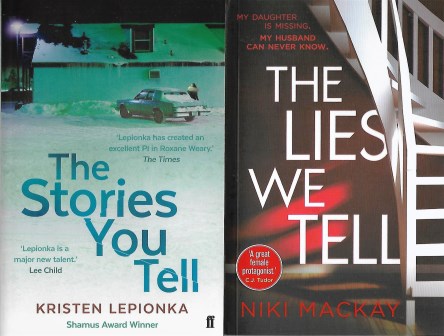
Two novels featuring female private eyes now; one English, one American but with titles which will inevitably get confused.
MA Investigations is not, as you might imagine, a postgraduate course in criminology, but the name of an all-female firm of private eyes named for ex-police officer Madison Attallee in the Lies We Tell by Niki Mackay, out now from Orion. On the other side of the pond, the wonderfully-named Roxane Weary (now there’s a gumshoe surname for you) takes up another case in The Stories You Tell by Kristen Lepionka, out this month from Faber.
It is good to see more female private eyes on the crime fiction shelves. It reminds me of those heady days, almost thirty years ago, when Sarah Dunant, Denise Danks and Stella Duffy took to those mean streets and did so with great aplomb.
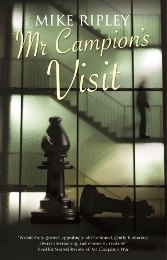
And I am reminded by the Magnificent Severn (House, that is) that I am contractually obliged to mention my own meagre offering this month, Mr Campion’s Visit, which brings a Golden Age detective, the admirable Albert Campion, into the Swinging Sixties [see Review HERE]and gives me the chance to be very rude about academics, modern universities, architects, bishops and country house mysteries.
Surely a hot favourite for next year’s Last Laugh Award…says the man who bet on Rory Stewart as our next prime minister. (Well I had to; his dad had a file on me.)
Still in Europe
Whilst
we still cling to Europe – if only by our fingertips – I should mention, whilst
I am still allowed, two imports (tariff-free) from MacLehose Press.
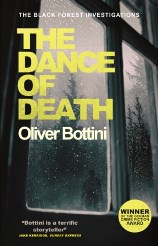 
From Germany, the award-winning Oliver Bottini gives us the third (I liked the first but somehow missed the second) novel in his ‘Black Forest Investigations’ series with The Dance of Death, which has a genuinely unnerving opening but fortunately Freiburg police detective Louise Boni to sort things out. From mountainous north-west Italy comes a thriller, Sanctuary, by an author who has been compared to Stephen King and Jo Nesbø; though that shouldn’t be held against Luca D’Andrea. I have no personal experience of this author, but I trust the judgement of my old and distinguished friend Marcel Berlins of The Times who said that D’Andrea ‘piles on the action and the atmosphere with panache’ and that’s good enough for me.
Birthday Honours (or should that be Honors?)
Lee Child was in the news last month and, unlike Boris Johnson, for all the right reasons. Firstly, advanced proofs of the new Jack Reacher thriller Blue Moon were circulated to lucky reviewers by his publisher Bantam, though mere mortals will have to wait until the end of October to get their hands on a copy.

Secondly, and it may have escaped the attention of Lee’s (and this column’s) readers on the other side of the Atlantic that Lee was awarded a C.B.E. in our Queen’s Birthday Honours list. For those, across the Atlantic, unfamiliar with the title Commander of the British Empire, I should point out that this rank now gives Lee full plenipotentiary powers to reclaim the original thirteen colonies and return them to the fold of the Empire.
Brexit Feast
I am fortunate to have numerous ‘family’ connections with the world of haut cuisine and access to the secret society of professional chefs who have, I can reveal, compiled an industry recipe book to be used after a No Deal Brexit. Whilst heavily reliant on the latest foraging techniques so fashionable in Nordic cuisine, the recipes do demand a certain amount of presentational flair as this one, my favourite, for Potato Carpaccio shows:

Fresh vegetables will be traded like currency in the years to follow after Brexit, so if you’re the lucky owner of a potato and don’t need it to barter your way out of a dangerous situation: congratulations! With such a luxurious ingredient you don’t want to mess about with it too much, and when the National Grid goes down and plunges us into a world without gas and electricity, the majority of cooking will be done over burning tyres. Why not retain the natural flavour of potato by simply serving it carpaccio-style instead? Simply slice it as thinly as you can then fan the segments for an attractive starter that is guaranteed to impress what remains of your family and friends.
Good Night and Good Luck,
The Ripster
|